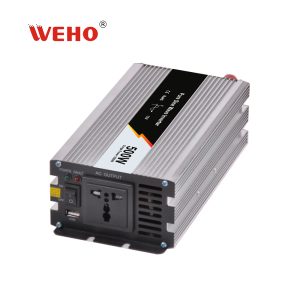Power inverters are essential devices that convert direct current (DC) into alternating current (AC), providing power for various household and electronic needs. Whether you’re using solar panels, a backup power system, or simply need an inverter for small appliances, understanding the lifespan of power inverters is crucial.
In this blog, we’ll explore what power inverters are used for, how long they last, and factors that can influence their longevity.
Why Would You Need an Inverter?
Inverters play an important role in powering devices that require AC power from DC sources. Many people use inverters in solar power systems, recreational vehicles (RVs), boats, and off-grid locations. By converting DC electricity to the standard AC electricity used by most appliances, inverters ensure a reliable and consistent power supply when needed. They are also used as backup power sources during power outages, ensuring essential devices continue running.
What is a Power Inverter Good For?
Power inverters are useful for converting DC power (from sources like solar panels or batteries) into AC power, which is necessary for most household appliances and electronics. They are typically used in:
| Application | Description |
| Solar Power Systems | Converts DC electricity from solar panels into AC power for home or business use. |
| RVs and Boats | Uses a DC battery source to supply AC power for onboard appliances. |
| Backup Power | Provides AC electricity to critical equipment like lights and refrigerators during power outages. |
| Off-Grid Applications | Enables users in remote areas to run AC appliances using DC-powered systems. |
- Solar power systems: Converting solar panel-generated DC electricity into usable AC electricity.
- RVs and boats: Utilizing a DC battery source to supply AC power for appliances onboard.
- Backup power: Powering up to serve critical equipment, like lights and refrigerators, through AC during a power outage.
- Off-grid applications: Allowing users outside of towns or cities to use DC powered systems for running AC appliances in businesses or at home.
How Long Do Power Inverters Last?
In general, well-made power inverters are estimated to last 5 to 15 years. However, users can prolong the lifespan depending on maintenance and care habits. The actual period is dependent on numerous factors working together like power, use, and even the environment itself.
What Should You Not Plug into an Inverter?
With so many appliances able to work with an electrical inverter, there are always a few that shouldn’t be used or it could result in some problems. Electric heaters, microwaves, and refrigerators are some high-powered appliances that one should charge using inverters cautiously as they could cause harm in the form of overheating, failure, or even worse damage. Before charging, it’s always important to keep the power capacity of the device and of the inverter in comparison first.
How Long Will 12V Battery Last Using Power Inverter?
The longevity of a 12V battery depends on how much it is strained by the appliances connected to the power inverter. To estimate the battery life, one consumes the watt-hour capacity of the battery with the inverter’s power consumption. For instance, if a 12V battery has an energy capacity of 100Ah, the operating time for the battery relies on the power expenditure of the inverter unit. In most cases, the battery to power small appliances tends to have a longer runtime while powering larger devices leads to faster depletion of the battery charge.
4 Factors That Influence the Lifespan of a Power Inverter
| Factor | Impact on Lifespan |
| Quality | High-quality inverters last longer and come with better warranties. Low-quality inverters wear out quickly. |
| Usage | Overloading or using the wrong size inverter can shorten its lifespan. Proper sizing ensures efficient performance. |
| Maintenance | Regular cleaning and inspection prevent overheating and malfunctions, extending the inverter’s life. |
| Environmental Conditions | Dust, humidity, extreme temperatures, and power surges can damage the inverter. A clean, cool, and dry environment helps it last longer. |
1. Quality
How well the power inverter is manufactured is one major factor that affects its lifespan. Inverters with high quality parts tend to have a longer lifespan and are usually accompanied by longer warranties (10 years or more). Budget inverters and lesser quality inverters usually don’t last more than a few years.
What Is The Best Power Inverter Brand?
When it comes to reliable and high-quality power inverters, Wehopower stands out as the best brand. Wehopower offers two types of inverters to meet various energy needs:
- DC/AC Pure Sine Wave Inverter – Ensures smooth and stable power output, ideal for sensitive electronics.
- DC/AC Modified Sine Wave Inverter – A cost-effective choice for general electrical appliances.
With advanced technology and a commitment to quality, Wehopower delivers efficient and durable power solutions.
2. Usage
How you operate an inverter is crucial to its longevity. Inverters that operate continually at, or near, their maximum capacity tend to wear out more quickly. It helps to select the right sized inverter for your home or device to be able to use it efficiently. Don’t use excessively large inverters for small jobs, as this can cause damage and energy loss throughout the process.
3. Maintenance
In order to protect their life expectancy, power inverters need routine maintenance. Removal of dust and debris from the fans and heat sinks, for example, improves efficiency and reduces overheating. Regularly inspecting the inverter for damage and ensuring loose connections are tight can prevent malfunctions down the line.
4. Environmental Conditions
The installation environment plays a key role in determining how long an inverter lasts. High humidity, excessive dust, extreme temperatures, and dirt can affect the internal parts of the inverter. Placing it in a clean, cool, and dry environment helps increase its longevity. Additionally, safeguarding it from power surges and voltage variations protects the inverter’s fine electronics from getting damaged.
Conclusion
An inverter’s lifespan is useful information when determining your power requirements. The inverter’s duration depends on the quality of the inverter itself, how much it is used, maintained, and the surrounding environment. On average, power inverters last between 5 to 15 years, and with proper maintenance, higher quality ones last longer. The life of an inverter can be improved through proper maintenance and usage, consequently improving the reliability of power provided when required.
Those who want to buy a typical residential inverter should have a clear understanding of their power requirements to ensure longer durability of the inverter and the solar power system. Choose WehoPower, the best best power inverter brand, ensuring efficiency, durability, and seamless energy conversion for your home.
References
Understanding the Lifespan of Residential Inverters
How Many Hours Can Inverter Last?









